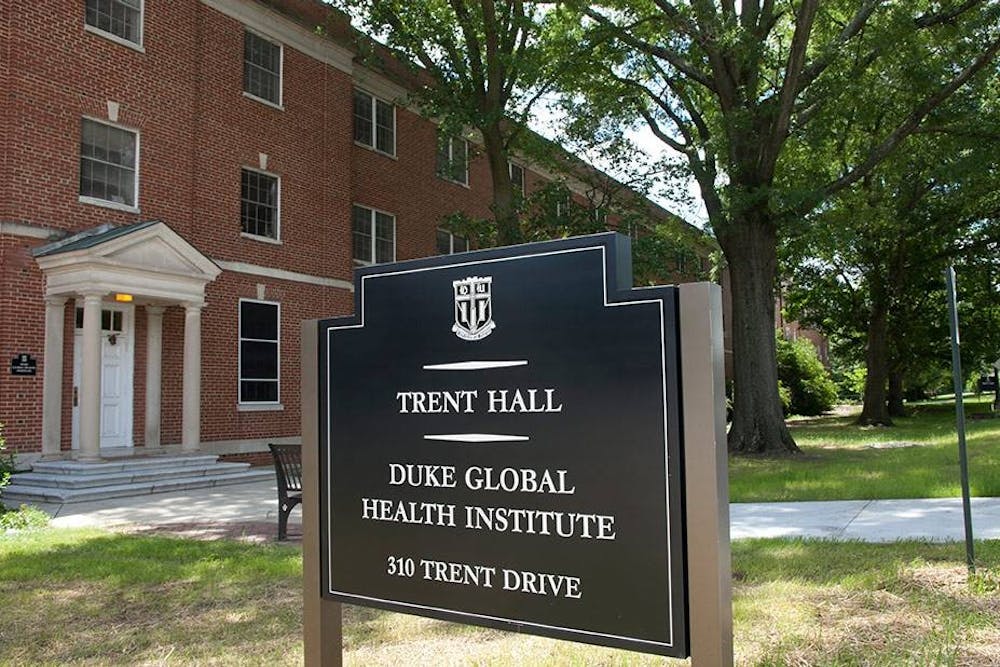In a time when global health is at the forefront of our minds, the Duke Global Health Institute has faced new challenges and seen new learning opportunities.
The DGHI, established in 2006, is working hard to keep current students going, and some classes have shifted to focus on the coronavirus pandemic. Meanwhile, the institute is looking ahead to a possible increase in applications.
Although it’s too early to say whether admissions to the DGHI will change, there could be an influx in applications in the future, according to Sarah Martin, DGHI’s assistant director for graduate admissions and special projects.
“We are in the process of finalizing the class that will begin the [Master of Science in Global Health] program this fall, and as of now we are expecting about the same number of students, or perhaps a slight increase, in this program as we have had in recent years,” Martin wrote in an email.
Martin mentioned that the institute has received applications from Peace Corps volunteers looking for alternative plans after the program was suspended in March. However, Martin wrote that “The pandemic was emerging around the time of our application deadline, and so it may not have been a large factor in motivating students who weren’t already interested in global health.” Applications for the graduate program were due March 30.
“We do expect that the pandemic may generate some new interest in global health, especially as it relates to infectious diseases,” Martin wrote. “And so we anticipate we may see increased interest during next year’s recruiting cycle.”
The curriculum also underwent changes to allow currently enrolled students to meet their degree requirements. DGHI Director Christopher Plowe wrote in an email to The Chronicle that students and faculty are collaborating remotely to complete thesis work now that experiential learning programs and University-sponsored travel are suspended.
“While some of our students do their global health fieldwork in the local community here in Durham and nearby, most travel to work with partners in our field sites in Asia, Africa and Latin America,” Plowe wrote. “So many students are working with their mentors to identify new projects that can be done remotely.”
He wrote that faculty were asked to locate datasets for students to use in the development of new projects, which led to a “huge outpouring of options” for students.
Although the institute had only a few online courses prior to the spring semester, Plowe said that the instructors who developed these courses in the past worked tirelessly to help facilitate the transition to remote learning.
Some courses have also shifted to a focus on the pandemic, with some courses taking a more interactive approach. Gavin Yamey, DGHI’s associate director for policy, hosted a mid-semester “Policy Idol” competition in his Health Systems in Policy and Global Health course. Students were required to develop policies pertaining to COVID-19 in specific low-income countries.
“I was one of the judges, and the students did a fantastic job on very short notice,” Plowe wrote.
Despite the relatively smooth transition, incoming and current students alike still face challenges.
Martin wrote that the pandemic has had a “dual effect” on the incoming class, with some students experiencing uncertainty around travel and securing visas and others mentioning the pandemic in applications and interviews. Plowe mentioned that the suspension of in-person classes caused a lot of anxiety among students, but that the institute aims to ensure students stay connected.
“For example, one of our students who found yoga to be a good way to deal with stress during deployments when she was in the military has been leading a Zoom yoga class for her fellow students on Tuesday evenings,” Plowe wrote.
Get The Chronicle straight to your inbox
Signup for our weekly newsletter. Cancel at any time.

Nadia Bey, Trinity '23, was managing editor for The Chronicle's 117th volume and digital strategy director for Volume 118.

